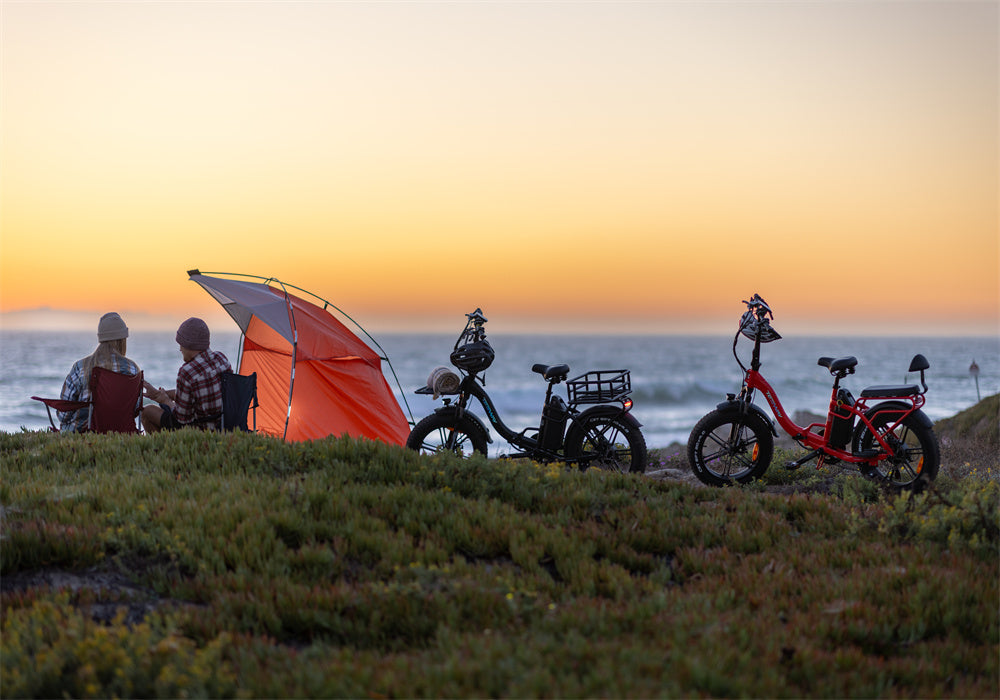Electric bicycles—and the economic efficiency they infuse into daily commuting—have propelled e-bike variants priced under $2,000 into widespread acclaim. The effortless usability and inherent enjoyment of ebikes render these affordable versions a compelling choice for brief journeys or relaxed recreational activities.
What Would Be A Price For A Bike
The cost range of ebikes can vary significantly. For entry level bikes in the price range of $500 to $1,000 you can anticipate features suitable for short trips or leisurely rides. These bikes typically come with batteries providing a range of 15 25 miles per charge and motor power ranging from 250W to 350W which's ample for flat surfaces and gentle inclines.
In the. Category, priced between $1,000 and $2,000 electric bikes offer enhanced build quality, extended battery life and more robust motors. These models often feature batteries that can cover distances of 30 50 miles and motors with power ranging from 350W to 500W ideal for terrains including moderate slopes.
High end ebikes priced at $2,000 and beyond boast cutting edge technology, premium components. Deliver top notch performance. Equipped with high capacity batteries these bikes can travel distances up to 70 miles or even more on a charge. The motors, in this segment often surpass 500W making them well suited for hills and longer journeys.
Beginner friendly electric bikes are a choice, for those starting out or working with a budget while mid range and high end models offer advanced features and performance tailored to riders with higher demands.

Which Class Of Ebike Is Best
Ebikes are grouped into various classes based on their motor capabilities and the level of assistance they offer.
Class 1 ebikes provide assistance when you pedal and have a speed limit of 20 mph. They are commonly permitted on bike paths and trails suitable for bicycles making them well suited for commuters, casual cyclists and those seeking a biking experience with some support.
Class 2 ebikes can be powered by a throttle without pedaling in addition to pedal assist restricted to 20 mph. The presence of a throttle makes class 2 ebikes adaptable for both rides and practical commuting purposes. They cater to riders looking for the flexibility to ride without pedaling or take breaks from pedaling during their journey.
Class 3 ebikes offer pedal assist up to 28 mph. Do not feature throttle control. With their speed capability Class 3 ebikes face restrictions, on bike paths and trails. Electric bikes are perfect, for riders, those who commute distances and individuals seeking higher speeds.
Class 1 and Class 2 ebikes are known for their versatility and wider acceptance making them popular choices for riders. On the hand Class 3 ebikes are tailored for those requiring speed during lengthier commutes.

What Is The Most Expensive Part Of An Ebike
Typically it's the battery of electric bicycle that takes the spot in terms of cost ranging from $300 to over $800. The quality of the battery plays a role in determining how far you can ride on a charge, especially crucial for long distance commuters. Most ebikes are equipped with lithium ion batteries due to their nature and high energy density factors contributing to their price tag.
The motor also stands out as an expense factor in an e bike setup. Prices usually range between $200 and $700 depending on power output and quality. Hub motors tend to be more budget friendly compared to drive motors that provide superior performance and efficiency but at a higher price point. The motor dictates the level of assistance you receive during rides.
Greatly influences how smooth your biking experience feels, making it a key element, for performance.The cost of an e bike is influenced by factors, like the frame, brakes, gears and suspension. Opting for high quality components ensures a durable and comfortable riding experience for riders.
In essence while the battery and motor are the elements of an e bike it's vital to prioritize quality components for an pleasant ride. When considering budget bikes striking a balance between cost and quality is key to maximizing value.
How Fast Can E-Bikes Go Without Pedaling
An appealing feature of electric bikes is their ability to provide assistance in riding enabling cyclists to reach speeds with exertion.What speeds can ebikes achieve without pedaling?
Class 1 ebikes lack a throttle system; thus they remain stationary without pedaling as the motor doesn't engage without pedal input.
On the hand class 2 ebikes are equipped with a throttle that allows them to move without pedaling and can reach speeds of up to 20 mph. This functionality proves beneficial for riders seeking respite from pedaling during commutes or, on level ground.
Class 3 electric bikes rely on pedal assistance. Do not feature a throttle. They can reach an assisted speed of 28 mph. The bike won't move without pedaling. Riders must pedal to make the most of the speed capabilities of class 3 ebikes.
On the hand class 2 e bikes come with the convenience of throttle power enabling speeds of, up to 20 mph without pedaling. This makes them a versatile option for riders.

Do You Need A 1000W Ebike
A motor with 1000W offers power making it well equipped to handle hills and heavy loads effortlessly. These motors can achieve speeds, which can be advantageous for long distance commutes or leisurely rides. However many areas have restrictions capping e bike motor power at 750W or below.
Going beyond this limit could lead to the bike being classified as a motor vehicle, necessitating licensing and insurance. Powered motors may also present safety concerns for inexperienced riders or in crowded settings.
On the hand a motor with 500W strikes a balance between power and efficiency suitable, for most commuting and recreational purposes. It can tackle hills. Provides a decent range of speeds.
For cyclists seeking a bit power a 750W motor offers improved performance while still adhering to legal regulations. It strikes a balance, between power. Following the rules.
If you're riding on gently sloping landscapes a 500W or 750W motor should suffice. Opting for a 1000W motor might be excessive. Could bring about complications relating to legality and safety concerns.
Who Makes The Best Affordable Ebike
TESWAY S7: A Popular Choice in Electric Bikes
With a speed of 28 mph the TESWAY S7 is ideal for trips or leisurely rides. You can cruise up to 80 miles on one charge giving you the freedom to explore without fretting about battery life.
The TESWAY S7 can support up to 330 pounds catering to riders. Its front hydraulic suspension system with lock feature ensures an easily manageable ride. Whether navigating city streets or rough paths this suspension setup absorbs shocks for a journey.
Thanks to its 7 speed transmission system adjusting to terrains like hills, descents or stop and go outdoor rides is effortless. This adaptability guarantees you have the gear, for any riding scenario.
The TESWAY S7 comes with 180mm*2.3T disc brakes providing braking power and a lightweight feel, for easy handling and safety in all weather conditions.
This electric bike is rated IP6 waterproof. Features disc brakes that perform well even in wet weather making riding in any condition smooth and worry free especially on rainy days.
It's no surprise that the TESWAY S7's a choice among electric bike enthusiasts. Priced at $899.99 it offers a value for those seeking to elevate their riding experience.
Himiway Cruiser ST/D3 ST Electric Bike
The Himiway Cruiser ST/D3 ST is equipped with a 750 watt gear hub motor delivering power to conquer terrains and slopes effortlessly. With a range of up to 60 miles on a charge it's perfect for rides or outdoor adventures.
With a weight capacity of 350 pounds this bike can accommodate loads ensuring you can bring along all your essentials on your travels. The Himiway Cruiser ST/D3 ST can reach speeds exceeding 20 mph allowing you to reach your destination swiftly and smoothly.
Boasting a frame that's twice as thick as models this bike offers enhanced durability and stability making it a dependable choice, for any rider.
If you're looking for a bit oomph and room to roam the Himiway Electric Bike Cruiser ST/D3 ST could be the pick, at a price tag of $1,099.99.
Whether you opt for the TESWAY S7 for its value and features or go with the Himiway Electric Bike Cruiser ST/D3 ST for its added power and capacity you're making a choice for your mobility and convenience. Both bikes deliver top notch performance and dependability ensuring you have a time, on your rides.
FAQs
How far can you travel on an e-bike?
The range of an e-bike depends on several factors, including the battery capacity, the level of motor assistance used, terrain, rider weight, and weather conditions. Most e-bikes offer a range between 20 to 50 miles on a single charge, but some models can go up to 80 miles or more.
Do you need a license to ride an e-bike?
In most regions, e-bikes do not require a license, registration, or insurance, especially for Class 1 and Class 2 e-bikes. However, regulations vary by location, so it's essential to check local laws regarding e-bike use.
How long does it take to charge an e-bike battery?
Charging times can vary depending on the battery size and the charger used. On average, it takes between 3 to 6 hours to fully charge an e-bike battery. Some high-capacity batteries may take longer, while fast chargers can reduce charging time.








Share:
Riding an Ebike: Good Exercise or Just a Breezy Way to Get Around?
Comprehensive Tips for Perfect Bike Tire Pressure on Any Terrain